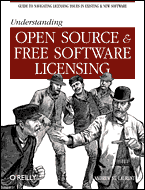Disclaimer
 As is customary when a non-lawyer attempts to discuss the finer points of the law, I must start with a disclaimer. I know some fine lawyers, but I, sir, am not a lawyer. So please do not consider this to be legal advice. It is merely a rough primer on copyright law as it pertains to software based on my readings and conversations. If you need specific legal advice, talk to your own lawyer.
As is customary when a non-lawyer attempts to discuss the finer points of the law, I must start with a disclaimer. I know some fine lawyers, but I, sir, am not a lawyer. So please do not consider this to be legal advice. It is merely a rough primer on copyright law as it pertains to software based on my readings and conversations. If you need specific legal advice, talk to your own lawyer.
Intro
After finishing the Fogel book, “Producing Open Source Software”, I followed up by reading “Understanding Open Source and Free Software Licensing” by Andrew M. St. Laurent.
This book combined with previous readings serves as the inspiration and source for this series. I will focus on the issues pertinent to software developers who wish to get involved in open source development. For a more complete treatment of the topics, I recommend reading the books mentioned.
In this first post in this series, I will discuss the basics of copyright law. This will set the stage for part 2 in which I will discuss software licensing.
Basics of Copyright
As soon as you set pen to paper, brush to canvas or fingers to that dirty keyboard, the work you create is automatically afforded protection by copyright law. This assumes that your creation is not itself infringing on another’s copyright as in plagiarism. Also, there must be a small degree of creativity in the work. For example, you cannot simply jot down and copyright names copied from a phone book. Additional copyright protection is available through registration with the copyright office.
Note that copyright applies to a particular expression of an idea, not to the idea itself. You can copyright a specific drawing of a penguin, but your copyright does not apply to drawings of penguins in general. Trademarks and patents are used to provide legal protections for concepts, ideas, facts outside of the scope of copyright law, but that is a topic out of scope for this post.
The Rights of Copyright
So exactly what rights do you have to copyrighted works? Well the obvious right is the right to copy. A copyright gives the owner full and exclusive rights to control who may copy or create a derivative of a work and how that may be done. As a copyright owner, you may state that nobody is allowed to copy or make derivative versions of your work (though the doctrine of “fair use” allows some non-infringing uses such as quoting from the work in a book review). A copyright gives the owner exclusive rights to a work, but this protection does not last forever.
If someone were to infringe on your copyright, you have the right to sue for damages, but this requires that you prove a loss occurred due to the infringement, which can be difficult. You may receive additional copyright protection by registering the work with the copyright office. For example, you can get “statutory damages”, compensation fixed by law that does not require proving an actual loss.
Who Owns Your Code?
Therefore you own the copyright to every line of code you write. Well... sort of.
The code a developer writes while an employee or client fall under the doctrine of “work for hire” and therefore belong to the employer (or client). Some independent contractors will stipulate in their service agreement with the client that even though the client owns the copyright to the code, the client shall give the contractor a non-exclusive license to the code.
Next Time: Licensing
In the next post in this series, I will discuss licensing and get into the nitty gritty as it pertains to open source software. Many thanks to my friend Walter Impert for his legal editing.
Source: Phil Haack
License: Creative Commons
